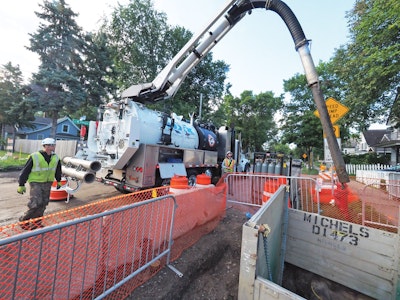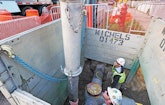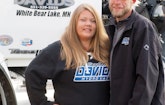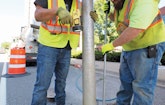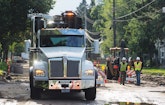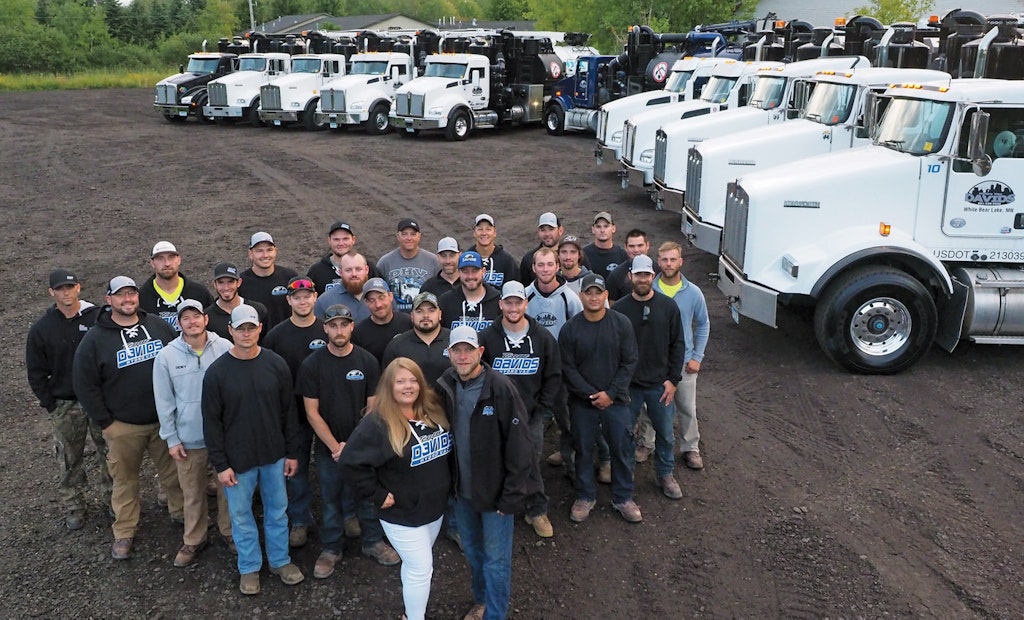
Davids Hydro Vac owners Mike and Heather Morehouse (front) with their staff and fleet of Vactor HXX hydroexcavators outside the company’s headquarters in White Bear Lake, Minnesota.
Interested in Business?
Get Business articles, news and videos right in your inbox! Sign up now.
Business + Get AlertsMike Morehouse faced plenty of obstacles when he started his business in 2009, which makes the company’s growth and success even more impressive.
Eight years later, Davids Hydro Vac — based in White Bear Lake, Minnesota — has 32 employees, 12 hydroexcavation trucks and a satellite office in South Dakota.
“I feel very fortunate and blessed that I was able to put all this together,” says Morehouse. “When I started out, I was 29 and had nothing. I was at a point where I needed to make something happen.”
Finding connections
Morehouse’s wild ride began in 2009 when he lost his job. He had just $18,000 to his name, a couple of credit cards, and a pregnant wife.
Through business contacts, he knew about some work coming down the pipe and decided to strike out on his own. He landed a contract to do utility line locating for an energy company on a pipeline project in northern Minnesota.
The bad news: He didn’t have a hydrovac truck. The good news: When it looked as though he might land the contract, he took a friend’s advice and contacted Jack Doheny of Jack Doheny Cos., a 40-year veteran of vacuum truck equipment sales, rental and service.
“Tom and Jack Doheny were instrumental in getting me started,” Morehouse says. “My business wasn’t even incorporated yet, but Jack took a liking to me. We threw a rental agreement together in two weeks. I had to borrow money from my family and didn’t even know how I’d pay for fuel. But I knew I had to go big and risk it all. If nothing else, I felt confident in myself because I knew I was good at what I do.”
Jack Doheny says he could tell Morehouse understood the industry and knew what he was doing. “Hard work doesn’t scare him. Plus, I was raised in Minnesota, and I know the work ethic people have there — they don’t mind getting their hands dirty — so I didn’t consider it a big risk. Even over the phone, I could tell Mike was a straight shooter.”
Used vacuum trucks are hard to come by quickly, but Jack Doheny Cos., had just taken in a rental hydroexcavator (a 2007 Vactor HXX PD) that would be ready in seven days — just two days before Morehouse was to start work on the pipeline project. So after using an online service to incorporate their company, he and his wife, Heather, flew to Michigan to pick up the truck and drive it back home.
“We were in such a hurry because I had to be in Bemidji, four hours north of the Twin Cities, in less than two days,” Morehouse says. “While Heather was filling out paperwork, people from Doheny were helping me grab everything I’d need. Then they gave me a slap on the rear, and we hit the road. About eight hours after we got home, I was headed for the job site.”
Ups and downs
The four-month-long pipeline job went well, but after that, work became scarce, and when Morehouse couldn’t make the lease payments, he had to give the truck back. “I felt like I’d let everyone down,” Morehouse says.
But after Morehouse found a job as a jetter-truck operator at a Wisconsin-based company, he got a call from another power utility that had heard about him through word-of-mouth. The company was dissatisfied with its hydroexcavating contractor and wanted to hire Morehouse. “Jack had told me that if I ever needed anything, I should just give him a call,” he says. “So I did, and we went through the whole thing all over again in August 2010.”
After that job, things slowed again, but Morehouse kept passing out business cards and making contacts. Soon, he was receiving steady work. “The exposure I received from working for that power company was key,” he says. “All it takes is one person who notices you do good work to go tell someone in the construction field that there’s a hungry kid out there busting his tail.”
Business quickly grew, and Morehouse leased a second truck in March 2011, a third in June 2012 and a fourth in March 2014. Making the payments was still difficult, but he increased cash flow in 2012 by finding a bank willing to finance the three trucks he owned at the time. That made his monthly payments more manageable.
Heading West
Davids Hydro Vac has continued to grow. The company is now running 12 Vactor HXX hydroexcavators, with a satellite office in Tea, South Dakota.
“We had been doing market research and paying attention to where our customers were,” Morehouse says. “When people think of expanding, it’s often to a heavily populated area because that is where you think the need for your trucks is. I didn’t feel like going where there were other truck companies set up. I didn’t feel like that was necessarily the right move, and I didn’t want to compete with a lot of people.”
Tea is a small community near Sioux Falls, South Dakota, with a population just shy of 4,000. It’s about a six-hour commute from White Bear Lake. “We’re learning a lot over there,” Morehouse says. “This is the first time we’ve done this, so we’re learning how to adapt and deal with different situations.”
The company keeps one hydrovac in Tea permanently but sends two more trucks from its headquarters when work requires it. The company is also looking for more local people to add to the staff there and support the community.
As the company’s fleet has grown, so has the number of employees. That required Morehouse to do something he thought he never would do — step back from operating the trucks and focus on the company’s growth. Hiring general manager Dustin Odegaard has allowed him to do just that.
“This is the first year that I have not had to operate a hydroexcavator,” Morehouse says. “I wanted to prove to myself and everybody else that I didn’t have to be the operator anymore — that the company can run without me doing that every single day. I should’ve gotten out of the truck two years ago. I should’ve listened to the people who were telling me to do that back then.”
Getting out of the truck has also allowed Morehouse to attend conventions and trade shows. “It has literally opened my eyes to what the industry has to offer,” he says.
Variety of applications
Morehouse prides himself on finding ways to work smarter, cut operating costs and serve customers better. A good example is the network of dumping sites he has established in strategic locations to reduce travel time.
“It’s really hard to find places where you can dump slurry,” he notes. “So whenever I had extra time, I would drive out to farmers and sand and gravel pits and ask if they’d accept slurry. I got a lot of ‘noes,’ but also received enough ‘yeses’ that I now have sites in and around the Twin Cities metro area. It’s all about time. Time is money, and customers don’t want to pay us to waste time.” He has done the same thing to establish convenient water-refill locations.
Morehouse enjoys the variety of ways he can wield hydroexcavation technology to solve customers’ problems. One day, he might expose building footings for a client who needs to know how deep they’re set. The next day, he might excavate in the basement of a giant building, perhaps 300 feet away from the truck. Or work on tunnel maintenance. Or potholing.
Emergency work is also part of the mix. Davids Hydro Vac excels at challenges that other companies don’t want or aren’t equipped to handle. In one instance, a contractor in Minnesota was boring under a lakebed to install a natural gas pipeline when a ground fracture released drilling mud into the shallow lake.
To solve the problem, Morehouse and his crew took a 6-foot-diameter, 6-foot-long piece of culvert pipe and set it down vertically over the fracture, containing the drilling mud. Then, they strung 400 feet of hose from shore and vacuumed mud out of the pipe. The truck expelled the mud through a decant hose and into a tail ditch, where vacuum trucks from another company sucked it up and hauled it away. “I was just blown away that one of our trucks could pull material that far,” he says.
Safety standards
Regardless of the application, safety is paramount in hydroexcavating, for employees’ well-being and to keep customers satisfied. Davids Hydro Vac employees undergo a year of training before they’re allowed to operate a $500,000 hydrovac truck on their own.
“It only takes one incident to cause a lot of problems, so we’re all about safety, safety, safety,” he says. “We might work for power companies and then water and sewer utilities and then mainline gas general contractors, and they all have different safety standards.
“Plus there are different ways to excavate soil. Most people think you’re just spraying water on the ground, but it’s a science — there’s a right way to do it. And you also need to know what you can get the truck into and out of. These are big trucks, and there’s a lot going on at construction sites. That’s why it takes a year for training. It’s for my comfort level and for my customers. I want our customers to know they’re getting an experienced operator.”
A bright future
After operating for eight years, Morehouse finally feels established: “We’re here to stay. We’ve got a good reputation, and that makes me want to work even harder. The guys and I all have something to prove.”
Morehouse says his company isn’t done growing yet. He’s already eyeing up an expansion into western Wisconsin in the next few years and hopes to continue building a presence in the Dakotas. “I’m going to stay focused and just be me,” he says.
Morehouse and his wife still have the David-versus-Goliath mentality that spurred the idea for the company, and they say that will never go away. “I’m going to fight for the little guy, and I want to be a part of change,” Morehouse says. “I’m going to advocate for hydroexcavators and for the industry. I think our industry is full of amazing people who work really hard for a living.”
Giving customers more options
Davids Hydro Vac initially focused on the typical hydroexcavation jobs — potholing, utility locating, trenching. Over time though, owner Mike Morehouse learned more about the machine’s capabilities and began to add services.
The White Bear Lake, Minnnesota-based company now offers many sewer cleaning services, such as manhole and catch basin cleanup, jetting, holding-tank cleanouts and water main break cleanups.
“It’s definitely a risk any business owner has to take, and we took it. It’s paid off so far,” Morehouse says. “It just gives customers another reason to call us “My main goal is to get the vac truck out there, so we have services that complement hydroexcavation.”
Morehouse is quick to note that the company isn’t looking to get into those sewer-cleaning services full time. They were added to supplement the services they already provide.
To help with those jobs, Morehouse bought a trailer unit from Vactor about two years ago at a trade show. “It’s been a nice addition,” he says. “It’s held its weight with those jobs, and it satisfies most of the customers. And I didn’t need to invest in a $500,000 truck.”
The company’s sewer cleaning work is mostly residential. Morehouse prefers to leave large municipal jobs — sewer cleaning, lining and other services — to other contractors or the cities themselves.
About 20 percent of the company’s annual business is water and sewer related, with most of that coming from water main breaks and lift station cleanouts.
“A lot of it is emergency stuff,” Morehouse says.
